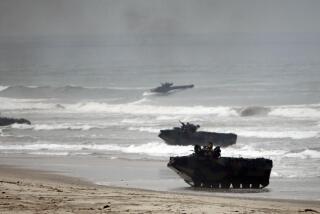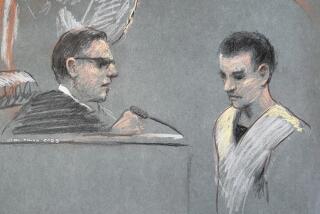Review Sought of Officers in Training Case : Marines: A military judge wants the service to examine the way they handled a Camp Pendleton incident in which seven men refused an order.
- Share via
SAN DIEGO — A military judge wants the Marine Corps to review the way officers handled an incident last fall when seven young Camp Pendleton privates, now known on base as the “Magnificent Seven,” refused an order to train.
Maj. J. L. Newton, who presided over the special court-martial of Pvt. Eric Ruzek, one of the seven, said Wednesday that he found nothing legally improper about the way officers behaved toward the privates during the Nov. 20, 1990, incident. However, he has requested a transcript of Ruzek’s trial so the Marine Corps can closely examine what took place.
“I specifically ruled that it was not improper as to matters of law,” Newton said as he presided over the pretrial hearing of another of the seven Marines. “(But) I indeed did make recommendations . . . to review procedures employed on that occasion (and) reconsider the procedures for handling recalcitrant, for lack of a better word, privates.”
According to several sources close to the case, the idea of refusing an order was suggested to Ruzek by his superior officer, a gunnery sergeant, who was angry that another Marine, Pvt. Michael J. Balaskovitz, intended to quit the corps.
Sources said the gunnery sergeant, whose name has not been released, sought to make an example of Balaskovitz, hauling him in front of his unit and demanding that if any other Marines wanted to join him, they should do so then.
Bill Smith, a Los Angeles lawyer who is representing Pvt. James Wendling, has told The Times that the gunnery sergeant pointed at Balaskovitz and told his men: “This man doesn’t want to be a Marine. If anybody else doesn’t want to be a Marine and fight for his country in the Middle East, stand up now.”
Instead of inspiring his men, sources said, the gunnery sergeant triggered a small-scale rebellion: eight men stood with Balaskovitz, including Ruzek. Two were later persuaded to rejoin their platoon, and the remaining seven, who have dubbed themselves the “Magnificent Seven,” were sent to the brig on charges including conspiracy, willfully disobeying a lawful order and dereliction of duty.
It was not clear whether the Nov. 20 incident was directly a result of the U.S. military buildup in the Persian Gulf. On Wednesday, the Marine Corps released a statement from one of the seven Marines who denied that he was trying to avoid service in Saudi Arabia.
The statement, attributed only to one of the seven, read in part: “I, one of the seven, feel that the severity of my actions has been overstated. . . . My reasons for refusing to train were not because of the crisis in the Gulf, but rather to attend to immediate, overwhelming domestic hardship problems at home and my personal situation.
“I have the utmost respect for the Marine Corps and what it stands for. . . . I feel the media does owe an apology to me and to the Marine Corps for falsely casting me as someone who would not want to serve in Saudi Arabia. These were false statements. . . .”
Balaskovitz, who goes to trial Monday, is accused of conspiring with two other Marines, Pfc. Donald C. Dicke and Pvt. Michael J. Spencer, to willfully disobey an order to train. Dicke is awaiting trial, according to Capt. Rose-Ann Srgignoli, a Camp Pendleton spokeswoman. Spencer has been convicted and sentenced to four months confinement and forfeiture of $500 a month for four months.
Three others of the seven have been tried, convicted and sentenced as well, Srgignoli said. None have received the maximum punishment, a bad conduct discharge.
Ruzek, the Marine at whose trial Newton made his recommendations, was convicted but received no punishment. The judge also recommended that if Ruzek performed well in the future, his battalion commander should consider setting aside the guilty conviction.
Pvt. Robert S. In received the same sentence as Spencer. Pfc. Frank J. Fuchs was sentenced to three months confinement, forfeiture of $400 a month for three months and reduction in rank to private.


